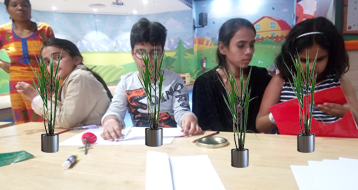
Starting a family garden is a wonderful way to provide healthy, fresh, and organic food for your table. A garden is also a place where your family can work together and build lasting memories, as well as develop a deeper appreciation for our planet's natural resources. Don't let a lack of gardening knowledge stand in your way — check out these tips for beginners and start digging!
1. Start Small
Your first year planting a garden is not the time to grow every vegetable you've ever wanted to serve on your table. Start small, and expect to make mistakes and learn as you go.
§ According to The Old Farmer's Almanac, "a good size beginner vegetable garden is about 16' x 10' and features crops that are easy to grow. A plot this size can feed a family of 4 for one summer, with a little extra for canning and freezing."
§ Strawberries, cherry tomatoes, and snap peas work well in a family garden because children are excited to watch them grow and can eat them once they're ready to pick.
§ Even a tiny patch of land can become a garden, but if you aren't ready to dig up your yard, try planting vegetables in pots or hanging baskets, or joining a community garden.
§ Borrow tools and supplies whenever possible. Once you've figured out which ones work best for your family's needs (and made the commitment to continue your garden in the future), then it's time to head to the store and invest in your own.
2. Learn From the Experts
If you're new to gardening, you're going to benefit from some guidance. Books like Gardening with Kids and blog posts like Gardening 101: 5 Gardening Basics for Beginners will help, but ultimately your best bet is talking with real people who have real-life gardening experience. Visit your local farmer, or ask your friend with the green thumb to help you get started.
There's a lot to learn — how to prepare your soil, when to plant your seeds, how much sunlight and water your garden needs, what composting means — so be sure you have the knowledge you need before you break ground.
3. Get Down and Dirty
Richard Louv, author of the groundbreaking book Last Child in the Woods, believes that children today desperately need to spend more time in nature, and a garden is a great way to get them excited about being outdoors.
Let your children spend hours digging in the soil, planting seeds, and catching worms. Encourage them to water the plants and watch for buds. Don't panic when they're covered in dirt from head to toe. And most importantly, do all of this with them — quality family time doesn't get any better!
4. Delegate Responsibility
Even the smallest member of the family can help in the garden.
§ Toddlers can rake dirt, pull weeds, and dig holes for seeds. They'll probably also be happy making mud pies and catching worms.
§ Elementary-aged children can help plan the garden, be responsible for watering plants daily, and are old enough to use child-proof scissors to harvest the plants at the end of the season.
§ Tweens and teens can help with the heavy lifting — from deciding which plants will grow best in your climate, to the logistics of what to plant where, to the hard work of tilling the soil.
5. Celebrate Your Bounty
Celebrating the fruits of your labor is the tastiest part of having a family garden. Homegrown fruits and vegetables have better flavor than the store bought variety, and really shine in simple dishes like fresh salsa or roasted vegetables.
If your garden produces more food than your family can eat, consider canning and freezing the extras, or sharing your bounty with others — friends and neighbors will certainly appreciate the extra zucchini. And if you really want to make a difference in the world, donate to those less fortunate.
HOW CAN PLAYBOX BOX HELP YOU START A GARDEN?
SHOWBOX – the Fun Performance Studio within PLAYBOX will host a series of workshops and events targeting toddlers, kids, parents and in many cases parents and kids together too. From helping you plant your first seedling, to helping to watch it grown, from building paper bags from recycled paper, activities on environmentally friendly methods of waste disposal, eco-friendly recycling activities and much, much more - these workshops will appeal to all and will also cater to pre-schools and kindergartens. This Studio is more of a retreat for child-parent bonding with an exclusive Workshop and Activity Arena targeted towards kids and parents for a timeline of 52 weeks initially.